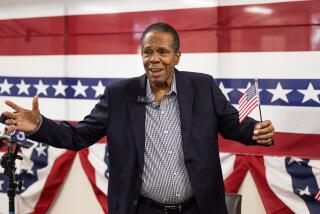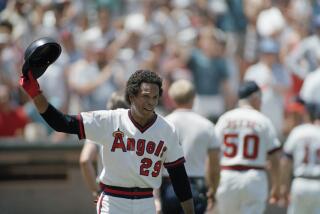Ordeal Helps Carew Open Up
- Share via
Rod Carew laughed when he recalled the reaction he’d get when he approached a stranger, handed him a business card with the phone number for the national bone marrow program and asked if he’d consider being a donor.
“They’d look at me like I was nuts,” Carew, the Angel batting instructor, said in a recent interview. “They’d say they would call and I’d say, ‘Don’t say you’re going to call if you’re not going to.’ And they’d say, ‘I will.’
“I’d tell them to look at the future of kids whose lives might be saved, that it’s worth having a sore back for a week or two. Saving a life has to be the most satisfying feeling a person can experience.”
Carew couldn’t save his daughter’s life. Michelle Carew, 18, died Wednesday morning at Children’s Hospital of Orange County after a seven-month battle against leukemia.
But because of Rod Carew’s efforts to raise awareness of the bone marrow donor program, because this once stoic Hall of Fame baseball player and sometimes aloof Angel coach decided to publicly show more of his human side, other lives have been--and will be--saved.
When the plea came from Michelle last November “to be my voice, not just for me but for all kids who need bone marrow,” the walls Carew had erected between himself and the outside world came crumbling down.
An intensely private man who hated talking about himself--it was part of the emotional barriers he put up because he was an abused child--and showed disdain for the media, Carew began calling reporters, who chronicled the family’s plight in newspapers and on television stations across the country.
Carew even stopped strangers on the street--hundreds of them, throughout Southern California and in other cities he traveled to--asking them to be screened as potential donors.
The response was overwhelming: In addition to the thousands of letters and hundreds of stuffed animals and good-luck charms Michelle received, more than 70,000 calls to the National Bone Marrow Donor program were generated by publicity from Michelle Carew.
Enrollment in the donor program also leaped to two million in March, up from 1.5 million the year before, thanks in large part to Carew’s efforts. “I’m sure lives will be saved because of them,” said Bonnie Martin, a spokeswoman for the marrow program.
At least one life was changed.
“I’ve become more emotional,” Carew said. “I never showed emotion before, no matter what I was going through, but since my daughter has gone through this I’ve cried more and opened up more to people I know care about me. Before, I would have just shut everyone out.”
In doing so, Carew learned “there’s some wonderful people out there--that’s the neatest part about this country. People always respond when there’s a need. . . . I was really taken aback by it all, because you just don’t know how people are going to respond.”
Angel players and front-office officials are proud of the way Carew responded to the crisis. Those who have known Carew for a long time knew how difficult it was for him to open up to the media, but Carew handled the attention as well as he handled the baseball bat during his storied 19-year baseball career.
“As a player he learned what his God-given talents were,” said Tim Mead, Angel assistant general manager and long-time friend. “As a person, you never know until you’re tested. Rod became educated in something he never dreamed of being educated in, and in turn he educated us, too. It’s inspiring to see how he has handled this.”
Carew admitted he was “an enigma” during his playing career with the Minnesota Twins and Angels. He kept to himself. He shunned publicity. He didn’t want people to get to know him, to know what he had gone through, “because I hated bringing back bad memories of my childhood.”
Sometimes when he did talk, it would come out wrong in the paper, “and I’d come out looking like a jerk, so the best thing for me was to be silent.”
But as his daughter fought for her life and his family came to grips with this deadly disease, Carew began to warm to the public, and he let others warm to him.
Said Carew of the children in CHOC’s oncology intensive care unit: “Every one of them becomes one of yours; their parents become your family members. You form bonds that were not there before, and you grab onto them.”
Carew vowed Wednesday that even though Michelle is gone, his fight and her fight against leukemia will live on.
“I’ll be here [at CHOC] any time of day or night to help them promote this cause,” Carew said. “I hope we can get a lot more donors, I’m glad we were able to be a part of it, to help some youngster or grown-up.”
Carew kept a daily diary during Michelle’s illness. He hoped Michelle would be able to read it when she got better, so she could know what she went through, realize what her family went through.
He also may write a book about his family’s ordeal, with proceeds going to CHOC and cancer research and, he hopes, his experiences helping other families cope with having a terminally ill child.
Most of all, he wants people to know about the Michelle Carew who hoped to beat this disease and become a nurse; about his outgoing daughter who, if she was in a room with 50 people, “would make friends with 48 of them in about 15 minutes,” about a little girl who couldn’t harm a living thing.
“If she found a cricket or a spider in the house, she would take it outside and let it fly or crawl away,” Carew said.
Carew also wants people to know about an unselfish young woman who, while fighting to save her own life, was more concerned with others.
“She cried not for herself,” Rod Carew said Wednesday, just hours after his youngest daughter had died, “but because her Daddy was crying.”
* MICHELLE CAREW DIES: Hall of Famer’s daughter, 18, loses a seven-month battle with leukemia. A1
* ANGELS WIN: Chuck Finley went the distance, giving up three hits in a 5-1 victory over Toronto. C4
More to Read
Sign up for Essential California
The most important California stories and recommendations in your inbox every morning.
You may occasionally receive promotional content from the Los Angeles Times.














